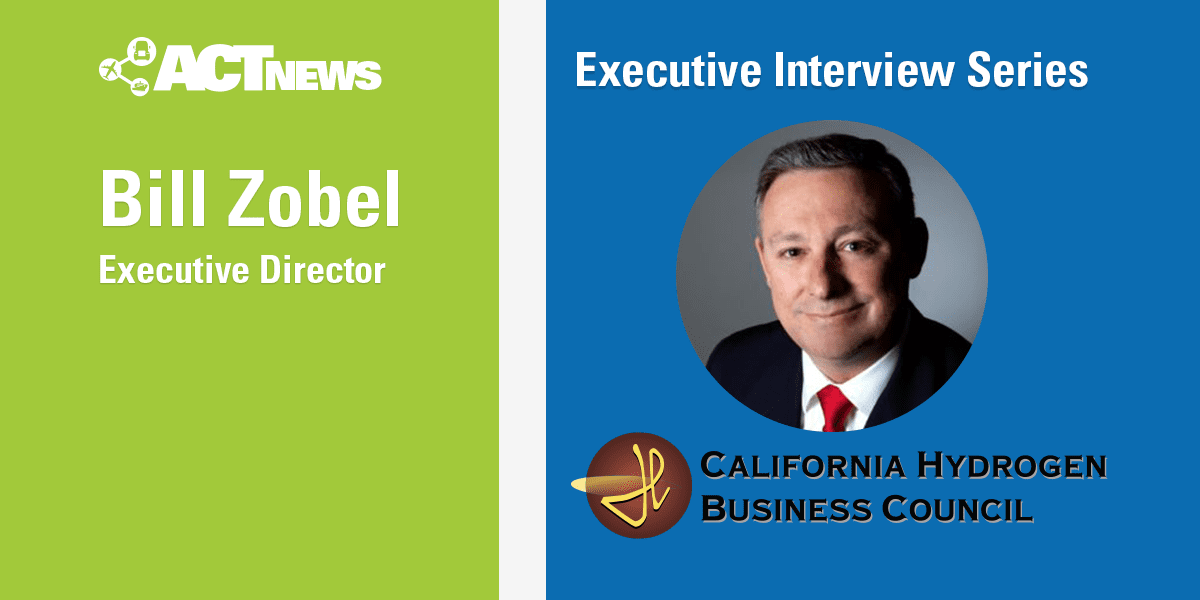An ACT News Executive Interview with Bill Zobel, Executive Director of the California Hydrogen Business Council to hear how several areas of the transportation market can be well served by hydrogen fuel cell vehicles.
The California Hydrogen Business Council (CHBC) is on a mission to advance the commercialization of hydrogen in the energy sector, including transportation, goods movement, and stationary power systems to reduce emissions. By adopting hydrogen and fuel cell technologies, California will reinforce its position as the most advanced clean energy state in the nation, expanding the sustainable use of its precious natural and renewable resources and providing clean air to its citizens. The CHBC is a membership-based trade association that represents a wide array of organizations and is the leading advocate for the hydrogen and fuel cell industry in Sacramento.
ACT News caught up with Bill to learn about his vision to advance the commercialization of hydrogen.
ACT News: You have years of experience in the development of alternative fuels programs, most recently helping to grow Trillium into one of the leading suppliers of alternative transportation fuels. Given your expertise, what is your vision for advancing the commercialization of hydrogen in the transportation and energy sectors?

Bill Zobel: I see hydrogen as a necessary element of California’s, the US, and the world’s efforts to reduce pollution and decarbonize the energy we use throughout the economy. The California Hydrogen Business Council (CHBC) has graciously granted me this opportunity to advance that cause. My vision is to unite the industry with the common goal of advancing the commercialization of hydrogen. This will come with many challenges and require both input and compromise from all parties. I believe the time for advancing hydrogen technology has never been better. For example, we see other countries making significant investments in hydrogen because they firmly believe it presents a path to decarbonization and reducing the pollution of their economy. Experts agree that scaling renewable hydrogen will make it affordable, mainstream, and part of everyone’s daily life. This is not to say hydrogen will be the only energy source, rather one of many technologies that are able to achieve similar long-term goals. My vision, beginning here in California, is to unite the industry and policy makers around the central idea that hydrogen must be part of our future if we are to achieve our goals. The time to get started is now.
ACT News: CHBC is the leading advocate for the hydrogen and fuel cell industry in Sacramento. What are some of the current public policies that CHBC is advocating for?
“Hydrogen must be a part of our future if we are to achieve our goals to reduce pollution. The time to get started is now.”
Bill Zobel: The CHBC is active in a host of policy making venues in the state all of which are aimed at increasing the commercialization of the technology and driving market scale. The Council represents a wide cross-section of the industry and academic institutions which provide an unparalleled level of expertise from which to draw upon. Our engagement covers the range of policy making bodies in the state that have influence on the state’s energy delivery systems and transportation markets. Specific activities include Integrated Resource Planning (IRP) and the Self-Generation Incentive Program (SGIP) at the California Public Utilities Commission (CPUC), engagement on the Integrated Energy Policy Report (IEPR) at the California Energy Commission (CEC), the Advanced Clean Truck Rule at the California Air Resources Board (CARB) and market enabling legislation. This is just a small sample of the many issues we are working for our members.
ACT News: At CHBC, one of the market sectors being focused on is the heavy-duty transportation, goods movement, and clean ports sector. Why is this an important sector for CHBC to focus on?
Bill Zobel: The Heavy-Duty (HD) transportation segment including goods movement, public transit and the clean ports sector presents a tremendous opportunity for scaling hydrogen. HD fuel cell electric buses are commercially available today and deployed at transit agencies here in California and across the US. Transit agencies across the globe are turning more to hydrogen fuel cell electric buses due to their operational capability and versatility. On the HD goods movement front, there are a host of fuel cell electric trucks being tested here in California. So far, we’ve seen that the hydrogen fuel cell power train is well suited for the HD truck duty cycle and the operational demands of the trucking industry. In short, there is real potential for hydrogen use to grow in the HD transportation sector.
“The transportation segment presents a tremendous opportunity for scaling hydrogen.”
ACT News: Hydrogen has long been touted as the fuel of the future. When can we expect fuel cell vehicles to reach scale?
Bill Zobel: I believe it will be sooner than we think. Experts across the globe agree that once clean renewable hydrogen reaches scale, it will be cost competitive for end users against almost any other form of energy. When or how quickly that happens is in large part dependent on policy makers. Our mission here at the CHBC is to educate policy makers and promote policies that move the commercialization of the technology forward, faster. I would use the example of how effective policy drove the wind and solar energy industry. Ten to fifteen years ago, these technologies were considered extraordinarily expensive and out of reach for society as a whole. Today, wind and solar are very competitive. This happened because policy makers put into place market enabling programs that supported research, investment, and wide-scale deployments of these technologies. As a result, the wind and solar industry flourish today, providing Americans good paying jobs, and contributing to a clean technology engine that drives our economy. Given similar policy support, hydrogen can accomplish the same, if not greater benefits.
ACT News: Why is hydrogen the best path for the transportation industry to improve its economic and environmental sustainability?
Bill Zobel: Hydrogen fuel cell vehicles can and will play an important role in ensuring we reduce pollution, decarbonize the transportation sector, and make zero emission technology available and convenient for everyone. There are several areas of the transportation market that can be well served by hydrogen fuel cell vehicles.
“Hydrogen fuel cell vehicles will play an important role in ensuring we decarbonize the transportation sector.”
ACT News: From the aspect of personal development and teamwork, what are your thoughts and practices related to mentoring?
Bill Zobel: Mentoring is very important to me personally and should be to any committed executive. I take it very seriously. Tomorrow’s leaders don’t just happen, they learn from their predecessors and successfully gather information to make them more effective. Mentoring accelerates this process and can be tailored to suit an individual’s personal style and areas of interest. I’ve mentored several people in my career, some I am aware of, others I’m not. Mentoring doesn’t have to be an overt action taken by a leader, rather it should be part of what a good leader does every day.
ACT News: What advice would you offer to young professionals interested in pursuing a similar career path?
Bill Zobel: Have in mind a career path for yourself but remain flexible. Your career will be impossible to forecast so keep your eyes open to new and exciting opportunities that fit your wants and needs. Continue to challenge yourself and do it daily. Focus on your strengths and leverage those to their upmost. Above all, know and be honest with yourself.
ACT News: What does true leadership mean to you?
Bill Zobel: Making a difference.
ACT News: What is the most important thing you have learned in the last five years?
Bill Zobel: Change is inevitable, be flexible and embrace it.


